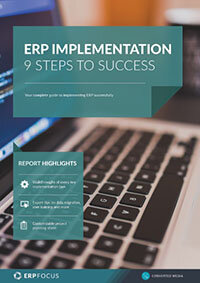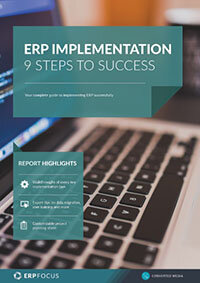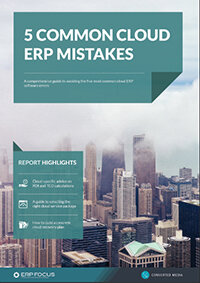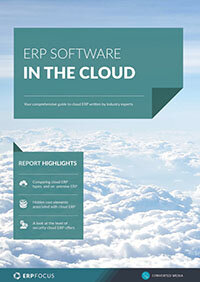Is Your ERP System Protected from the Most Critical Risks?
Ensuring the security of your data is a key business priority – but are you confident your ERP system is protected from the following risks?
As ERP systems offer ever-widening functionality, more dangerous ERP security issues arise that may not have been considered before.
In a competitive ERP system market, a lot of suppliers will rush to provide more features and updates to secure more sales and business, failing to consider critical security issues. What’s more, these vulnerabilities are as likely to be exploited by insiders as they are by external threat, according to Gartner.
So how can you guarantee the ERP system you put in place is not vulnerable to new, complex security threats? Know thy enemy and stay one step ahead. Get to know the potential risks your ERP system may face, and what to do about them.
Abuse of Authorisation
With more staff authorised on your ERP system, there’s an inevitable increase in the likelihood someone may abuse the trust you have placed in them. While you can’t change the nature of such people, technology can help you make it more difficult to carry out any dishonest aims, as well as preventing any honest mistakes.
The latest ERP software covers various areas of your business on a central platform, so more users will have shared access. You’ll need to choose a solution that also gives you greater control over what individual users have access to. This ensures everyone is using data that is relevant to their work, and understands the procedure for requesting additional information in extreme or unexpected circumstances.
Device Overload
New ERP capabilities mean businesses can be more agile and responsive than ever before. Whether it is responding to a food safety concern or a last-minute order increase, you’re able to track stock levels and movements as you go along, and react accordingly from anywhere in the world. But with more individual device usage comes a host of potential complications.
Whether you allow people to use personal devices for logistics, accounts, planning or analytics purposes, or offer company smart phones or tablets, you need to balance the freedom of mobile devices with a comprehensive BYOD policy on their usage. This should include, the following:
- Specify access for what is necessary, restrict what isn’t
- Create access codes that are secure and update them regularly
- Track internet and app usage to help ensure the system isn’t running slowly on devices and that the risk of viruses is kept to a minimum
How much personal device use you tolerate is up to you, but ensure your staff is aware of all the risks involved and highlight potential security issues they might not know about.
Leaking Stock Drains Profits
Stock leakage happens when stock is damaged, order mistakes are made, or, stock is stolen. Stock damage is difficult to eradicate completely, but the other two causes are much more preventable.
To cut down on leakage, warehouse facilities must be kept secure with lock-down procedures and regular stocktaking – that means there is no opportunity for leaks as all stock is closely accounted for. Cutting-edge ERP software makes regular stock taking a less time-consuming process, so you can easily integrate it into your day-to-day operations.
The Gathering Cloud
Cloud ERP is becoming more widely adopted amongst buyers, which means many organisations are concerned about what it means to move all their vital data and functions to a third party provider. The system could still have the same security issues an in-house server would – transmission and data security, physical safety, access and so on.
But can you really trust your critical business data in a third-party Cloud?
Cloud-based ERP is an area where security issues are actively being addressed, and security concerns from users have decreased significantly as a result. The physical location of a Cloud system is often far more secure than an office server room.
When choosing a Cloud provider, verify they have procedures in place to keep data and transmissions secure, and that there are safety nets and measures in place when things go wrong.
Having open eyes to the risks threatening your ERP system security means you can pick the best software provider – one who understands the weight of security issues and places as much importance on them as you do.
Free white paper

ERP Implementation: 9 steps to success
The 9 proven steps you should follow when implementing ERP

Featured white papers
-

Five common cloud ERP mistakes
Get your comprehensive guide to avoiding the five most common cloud ERP errors
Download -

Related articles
-

How to conduct a thorough ERP audit
The types of ERP audit, and step-by-step instructions on how to audit your ERP system
-

Secret KPI: Why Your ERP Implementation Team Matters More Than Software
Learn how Godlan ensures successful ERP implementation for manufacturers with proven strategies &...
-
![Three direct links between ERP and manufacturing revenue [image by Snowing on Freepik] Three direct links between ERP and manufacturing revenue [image by Snowing on Freepik]](/pictures/W1siZiIsIjIwMjUvMDEvMjAva2ZwYjAzb3gzX1RocmVlX2RpcmVjdF9saW5rc19iZXR3ZWVuX0VSUF9hbmRfbWFudWZhY3R1cmluZ19yZXZlbnVlX2ltYWdlX2J5X1Nub3dpbmdfb25fRnJlZXBpa18uanBnIl0sWyJwIiwidGh1bWIiLCI0MDB4MjY2IyJdLFsicCIsImVuY29kZSIsImpwZyIsIi1xdWFsaXR5IDg1Il1d/Three%20direct%20links%20between%20ERP%20and%20manufacturing%20revenue%20%5Bimage%20by%20Snowing%20on%20Freepik%5D.jpg?sha=b45b02a140cc8680)
Three direct links between ERP and manufacturing revenue
What you need to know to help you achieve a return on your manufacturing ERP investment

